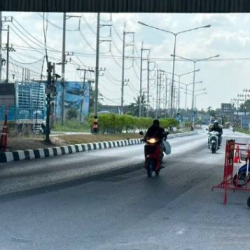Thai exports are rebounding but huge trade deficit with China poses a threat

Exports are bringing cheer to Thailand’s gloomy economy, growing 10 per cent year on year in January, the highest in 19 months.
The January results marked six consecutive months of export growth, offering hopes of gross domestic product (GDP) expanding greater than last year’s sluggish 1.9 per cent.
Thailand’s export of merchandise contracted 1.5 per cent in 2023, but it started to turn into positive territory in the fourth quarter of the year.
Pisit Puapan, director of the macroeconomic policy bureau at the Fiscal Policy Office, says exports expanded 3.4 per cent year on year in the fourth quarter of 2023. He believes the momentum of exports, along with rising private investment, consumption and tourism, will drive the economy this year to grow 2.8 per cent, slightly higher than the 2.7 per cent growth forecast by the National Economic and Social Development Council, a state think-tank.
A welcome start to the year
The growth trajectory of exports in January breathes new life into expectations for 2024, as many research houses are forecasting GDP growth would be higher than in 2023.
The Commerce Ministry reported exports in January were worth US$22.6 billion. Products reporting strong exports included computer and parts, steel, machinery equipment and parts, jewelry, rice, chicken, rubber, rubber products, canned seafood, fruits and beverages.
Exports to the United States grew 13.7 per cent, to the European Union by 4.5 per cent, Asean by 18.1 per cent, China by 2.1 per cent and Japan by 1 per cent, according to the Commerce Ministry.
The ministry has predicted that exports will continue to grow in February and March and has forecast full-year export growth of 1-2 per cent.
Thai imports also increased in January, by 2.6 per cent year on year, valued at $25.4 billion, resulting in a trade deficit of $2.8 billion.
Chaichan Chareonsuk, chairman of the Thai National Shippers’ Council, said that exports of manufacturing goods were recovering. Key factors impacting Thai exports now include higher oil prices and the high cost of freight due to security risks caused by Houthi rebels attacking cargo ships in the Red Sea. The demand for fruits and rubber products from China would also play a key role in Thai exports this year, he added.
Mounting trade deficit with China
An alarming issue for the Thai economy is the mounting trade deficit with China, as cheap imports are far outpacing Thailand’s exports for many years.
In January alone, though Thai exports to China were worth $2.3 billion, imports amounted to $6.8 billion, leaving the country to deal with a trade deficit of $4.6 billion. This is higher than the $2.9-billion deficit in December and the $4.1-billion deficit in January 2022.
Local manufacturers have complained of cheaper products from China flooding local markets and threatening to wipe out small and medium-sized industries which are the main source of local employment.
Local business leaders have called on the government to impose some kind of measures that could protect local industries and possibly prevent Chinese traders from taking advantage of loopholes in free trade agreements.
Two-way trade between Thailand and China has increased rapidly since China’s accession to the World Trade Organization in 2005. Thailand has been reporting a trade deficit with China for years, with no way in sight to plug the gap.
For example, Thailand ran a trade deficit with China of $313 million in 2002. Ten years later, the deficit had surged to $10.5 billion in 2013 and by more than three times to $36.6 billion last year. Last year, two-way trade was valued at $104.9 billion, with Thailand’s exports to China worth $34.2 billion and imports of Chinese products valued at $70.8 billion.
Key items imported from China include household electrical appliances, fresh and processed fruits, clothes and shoes, furniture and home decoration, kitchenware, buses and trucks, plastic products, chemical products, electric power machineries and parts, computers and parts, iron and steel products, mineral products and metal scrap, and machinery equipments and parts.
Factors behind cheap imports
Prime Minister Srettha Thavisin has pledged to help the local industries. He admitted that there were three key factors behind the high volume of Chinese products flooding the domestic market.
First, importers declared a lower value of the goods — at below 1,500 baht a piece — in order to evade the 7 per cent value-added tax payment.
Second, Chinese traders were flooding Thai markets with cheaper products via online shopping and exploiting a loophole in the Free Trade Zone to evade Customs duties.
And third, Chinese goods are smuggled into the country by falsifying import documents to evade Customs duties.
Srettha said the private sector, led by the Joint Committee on Commerce, Industry and Banking, had informed him about the issues and proposed solutions. Srettha recently ordered senior officials at the Finance Ministry, Revenue Department and Customs Department to sort out the problems with the private sector.
By Thai PBS World’s Business Desk






